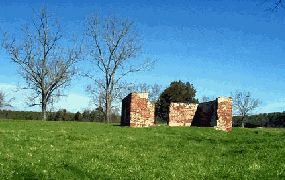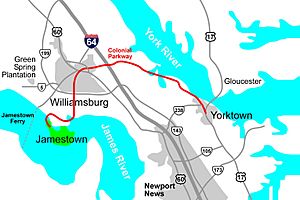Green Spring Plantation facts for kids
|
Green Spring
|
|

Remains of ancillary jail structure at Green Spring Plantation site
|
|
| Nearest city | Williamsburg, Virginia |
|---|---|
| Area | 190 acres (77 ha) |
| Built | 1645 |
| Part of | Colonial National Historical Park (ID66000839) |
| NRHP reference No. | 78000261 |
Quick facts for kids Significant dates |
|
| Added to NRHP | December 29, 1978 |
Green Spring Plantation is a historic site in James City County, Virginia. It is about five miles (8 km) west of Williamsburg. This was once a large farm, called a plantation, in the 1600s. It was owned by Sir William Berkeley, a famous governor of Colonial Virginia, and his wife, Frances Culpeper Berkeley.
Sir William Berkeley was one of Virginia's best-known colonial governors. He served many terms. The famous Berkeley Plantation nearby was not named after him, even though some people think it was.
Today, a part of the land that was once Green Spring Plantation is now part of the Colonial National Historical Park.
Contents
History of Green Spring Plantation
The name Green Spring Plantation comes from a natural spring on the land. This spring still flows today, over 350 years later. It produces a lot of very clear, super cold water. A visitor in the 1680s wrote that the water was "so very cold that 'twas dangerous drinking the water thereof in Summer-time!"
Building the Plantation House
The main house at Green Spring Plantation was built in 1645. The plantation started as a large experimental farm, covering about 2,090 acres.
Crops and Trade
At Green Spring, they tried to grow different crops to sell. Tobacco was the main crop in the colony, but they wanted other options. So, Green Spring produced flax, fruits, potash, rice, and even silk. They also made spirits. These products were shipped to markets in North America, the Caribbean, Great Britain, and Holland.
Owners of Green Spring
Governor William Berkeley owned the plantation until he died in 1677. After his death, his wife, Lady Frances, married Philip Ludwell. The plantation then passed to him. Later, it went to his son, Philip Ludwell II, and then to his grandson, Philip Ludwell III.
In 1683, a windmill at Green Spring was chosen as the spot for the King's storehouse.
Important Events at Green Spring
Green Spring Plantation saw many important historical events. These include:
- The start of slavery in Virginia.
- Bacon's Rebellion in 1676, a time of unrest in the colony.
- The Battle of Green Spring in 1781, during the American Revolutionary War.
- The freedom of its enslaved people in 1804, as stated in the will of William Ludwell Lee.
- The nearby Battle of Williamsburg in 1862, during the American Civil War.
A second large house on the plantation was burned down during the Civil War.
Preservation of the Site
Today, about 200 acres of the original plantation are protected. The National Park Service (NPS) looks after this land. They bought the property in 1966. It is now part of the Colonial National Historical Park.
The site includes old archaeological remains and parts of the original buildings. These show what the manor house and other structures looked like. Green Spring was added to the National Register of Historic Places on December 29, 1978. Some historians believe that many courthouses in Virginia were designed like the Green Spring house.
 | Aurelia Browder |
 | Nannie Helen Burroughs |
 | Michelle Alexander |




